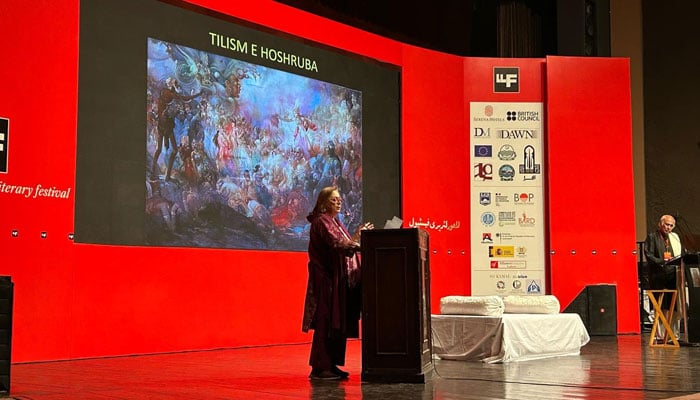Lahore Literary Festival ends with captivating debates
LAHORE: The dynamic twelfth edition of the Lahore Literary Festival (LLF), spanning three action-packed days, came to a close at Alhamra, The Mall here on Sunday.
This vibrant event united prominent writers, poets, artists, and scholars from Pakistan and beyond, fostering captivating conversations and stimulating panel discussions. A standout feature of this year's festival, in collaboration with the Mohatta Palace Museum, was the captivating finale session titled “Magical Epics.” This session delved into the rich storytelling traditions of Persian and Urdu literature. Scholars Shahnaz Aijazuddin and FS Aijazuddin provided insightful readings and contextualization of Tilism-e-Hohruba and Hamzanama. The hashtag #LLF2024 remained prominent on different social media platforms, despite the ongoing unavailability of social media platform X, formerly known as Twitter, within the country. It's worth noting that the shutdown of social media platform X has persisted for eight consecutive days in Pakistan, extending through Sunday.
“Lahore's essence of arts and culture shines brightly through events like LLF, showcasing the city's rich heritage amidst the pervasive influence of digital distractions. Such gatherings offer a breath of fresh air, and I commend the organizers for their efforts,” commented Haris, one of the attendees.
He expressed his delight in experiencing the vibrant atmosphere over the three days and proudly mentioned not missing a single day of the event. “From screenings to engaging conversations, insightful panel discussions, and book launches, the festival catered to diverse interests, embodying the essence of what festivals are all about,” remarked Komal, another attendee.
In the session titled “Future of the Written Word in an Age of A.I.,” featuring acclaimed writers, essayists, novelists, and poets, the speakers predominantly voiced their fears regarding artificial intelligence (AI).
Author Mohsin Hamid articulated concerns about AI posing a threat to various job sectors, especially for writers, due to its impact on the nature of human attention. However, he also emphasised the intrinsic value of humanity, highlighting that despite being developed by humans, AI lacks the essence of humanity.
While reflecting a preference to maintain the distinctiveness and autonomy of human consciousness separate from artificial entities, Mohsin was of the view that personally he did not want a shared consciousness with a machine.
Author Monica Ali discussed her experience with AI-powered writing tools, noting that while the paid options were more advanced and sophisticated, the overall quality of the results was still relatively poor. This sentiment echoed the experience of essayist and humorist David Sedaris, who remarked that, in his opinion, the AI's writing resembled that of an eighth-grader.
Novelist, poet and playwright, Hannah Dubgen also spoke at the session which was moderated by Emma Clark, Afghanistan and Pakistan News Editor for AFP. According to some attendees, the lack of an A.I. expert on the panel underscored the necessity for such expertise in future discussions regarding the convergence of A.I. and the written word, ensuring a more thorough and comprehensive dialogue.
Earlier, in a session titled “Museums in the West and Pakistan: How Do We Safeguard Our Treasures?” Alejandro Vergara, senior curator of Flemish and Northern European paintings at the Museo del Prado in Madrid, shared valuable insights on museum visits and the exploration of art.
-
 Zayn Malik Shares Important Update About His Love Life
Zayn Malik Shares Important Update About His Love Life -
 Kate Middleton, William Are Holding Onto Their Hats As Worse Gets Threatened: Behind The Veil Of Shame
Kate Middleton, William Are Holding Onto Their Hats As Worse Gets Threatened: Behind The Veil Of Shame -
 British Soap Awards Scrapped Again As ITV Confirms 2026 Hiatus
British Soap Awards Scrapped Again As ITV Confirms 2026 Hiatus -
 Climate Nearing Dangerous Tipping Points, Study Shows
Climate Nearing Dangerous Tipping Points, Study Shows -
 James Van Der Beek, 'Dawson's Creek' Star, Dies At 48
James Van Der Beek, 'Dawson's Creek' Star, Dies At 48 -
 Threads Launches Dear Algo AI Feature To Personalise Feeds In Real Time
Threads Launches Dear Algo AI Feature To Personalise Feeds In Real Time -
 Police Take Action Over Andrew's Ties With Jeffrey Epstein While In UK Office
Police Take Action Over Andrew's Ties With Jeffrey Epstein While In UK Office -
 Courtney Love Makes First Appearance Since New Report On Kurt Cobain's Death
Courtney Love Makes First Appearance Since New Report On Kurt Cobain's Death -
 King Charles Anxious As Uncertainty Grows Over Sarah Ferguson’s Next Move
King Charles Anxious As Uncertainty Grows Over Sarah Ferguson’s Next Move -
 Real Reason Kim Kardashian Is Dating Lewis Hamilton
Real Reason Kim Kardashian Is Dating Lewis Hamilton -
 Rihanna Leaves Elderly Woman Star-struck In Viral Grocery Store Video
Rihanna Leaves Elderly Woman Star-struck In Viral Grocery Store Video -
 TikTok US Launches Local Feed Using Precise Location Data
TikTok US Launches Local Feed Using Precise Location Data -
 Jill Biden’s Former Husband Charged With Wife’s Murder
Jill Biden’s Former Husband Charged With Wife’s Murder -
 Zayn Malik Reveals Parenting Decision Gigi Hadid Criticized Him Over
Zayn Malik Reveals Parenting Decision Gigi Hadid Criticized Him Over -
 Palace Releases Prince William's Photos From Final Day Of His Saudi Arabia Visit
Palace Releases Prince William's Photos From Final Day Of His Saudi Arabia Visit -
 Microsoft Warns Of AI Double Agents As Enterprise Adoption Of AI Agents Surges
Microsoft Warns Of AI Double Agents As Enterprise Adoption Of AI Agents Surges




